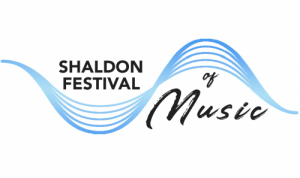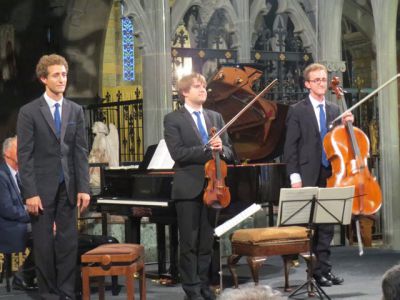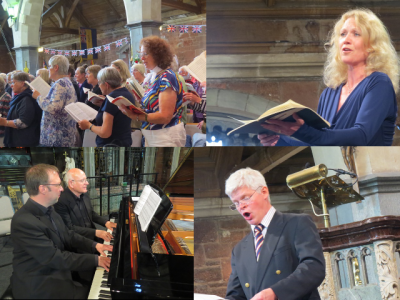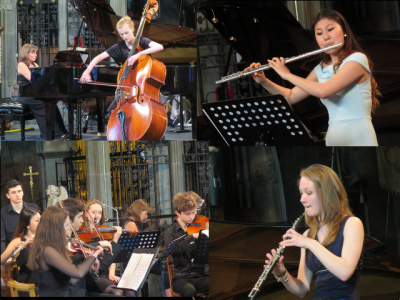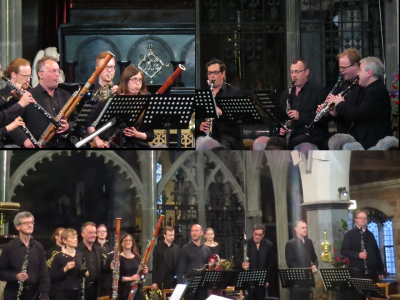Shaldon Festival 2016
Click on the past performances to jump to the information or scroll down the page.
Choral Workshop and Informal Concert 2016 directed by Stephen Threlfall
Chetham’s School of Music 2016
Busch Trio
Concert
Sunday 19 June 2016
Omri Epstein – Piano
Mathieu van Bellen – Violin
Ori Epstein – Cello
Programme:
FRANZ JOSEPH HAYDN Trio in E flat minor XV:31 ‘Jacob’s Dream’
DMITRI SHOSTAKOVICH Trio No.2 in E minor Op.67
Interval
FRANZ SCHUBERT Trio in E flat Op.100
Concert Review
The final concert of the Festival was very special. The Busch Piano Trio, playing with a maturity way beyond their years, was an absolute treat.
They began with Haydn’s Trio in E flat minor. The first movement, a poignant and simple Andante was beautifully played and contrasted with the livelier Allegro known as ‘Jacob’s Dream’ owing to the energetic scalic passages.
Lovely to hear the violinist Mathieu van Bellen then speak about his violin, previously owned by Adolf Busch, and his connection with Chetham’s School of Music, as an ex-student.
The Shostakovich Trio No.2 in E minor is an extraordinary piece, typically full of contrasts, and taking us from high excitement to the depths of despair. The piece began with the eerie thin texture leading to an energetic dark and angry Allegro. The trio showed their amazing technical skills in this very demanding movement as well as their ability to convey a huge range of emotion often changing very quickly. The following dance based Allegro was frantic and gripping, the Largo bleak and heart wrenching and led straight into the urgent driving final movement with quotes from previous movements and the 8th quartet. The Busch Trio played this piece with such skill and intensity; one was totally immersed in the emotional experience.
The Schubert was much needed after this and was again played with total understanding, warmth and stunning ensemble. From the lively and complex Allegro through the well-known melancholy canonic Andante, the sparkling Scherzando and the inventive and dazzling virtuosic finale, the Busch were the highly competent vessels through which this music flowed abundantly.
The Busch Trio were as one, moving together, almost breathing together as the Times put it, and even synchronizing their vibratos! Their sensitivity, range of tone, and superb musicianship gave us an absolutely memorable experience. The players magically held the audience in silence at the end of every movement of each piece – by holding themselves, their breathing and ours in perfectly still contemplation for several seconds. I have never seen this done before so well.
How fortunate we were.
Kate Hill-Art
BUSCH TRIO
Named after the legendary violinist Adolf Busch, this young piano trio has emerged as the leading piano trio among the new generation, receiving enthusiastic responses from audiences and critics across the UK and Europe. Winners of the 2012 Royal Overseas League Competition, the trio went on to win several prizes including 2nd prize at the 2012 Salieri-Zinetti International Chamber Music Competition and the 3rd prize at the 2013 Pinerolo International Chamber Music Competition in Italy as well as the 2nd prize at the International Schumann Chamber Music Award in Frankfurt.
Since its formation in 2012 highlights of the Trio’s performances in the UK have included the Wigmore Hall, Edinburgh Festival Fringe, Queen Elizabeth Hall and the Sage Gateshead, and they have also given concerts in the Netherlands, France, Germany, Switzerland, Italy, Belgium and Denmark. Their recent Wigmore Hall appearance was received to critical acclaim, with The Times commenting: “most impressive was the group’s effortless musicianship and unity of thought and attack. The threesome even seemed to be breathing in synch.” Recent and forthcoming seasons include a tour of China, collaborations with Michael Collins and Bruno Giuranna, and recitals in the Wigmore Hall, King’s Place, Brussels’s Bozar and Amsterdam’s Concertgebouw. They are frequent visitors to BBC Radio 3 InTune programme and have been broadcasted live on Belgium’s Musiq’3.
As three soloists in their own right, Omri Epstein “the group’s marvellously sensitive pianist”, Mathieu van Bellen, whose “silvery gleam darted eloquently”, and Ori Epstein, with whom “you felt in the grip of a warm hug”, have all won prizes in solo international competitions. Brought together by a shared deep passion for chamber music and inspired by Mathieu’s possession of the “ex-Adolf Busch” J.B. Guadagnini violin (Turin, 1783), they have been recognized for their achievements and their playing with “incredible verve”. The trio enjoyed the support of the Tunnell Trust, the Kirckman Concert Society, the Park Lane Group and the Cavatina Chamber Music Trust, as well as being awarded the MMSF Philharmonia Orchestra Ensemble Award. Most recently they have completed the prestigious ChamberStudio Mentorship Programme, which has offered them teaching from some of the world’s leading musicians. They are currently receiving guidance from members of the Artemis Quartet at the Queen Elizabeth Music Chapel in Brussels. The Busch Trio can look forward to their first CD recording project with Outhere Music on their Alpha Classics label of the complete Dvorak piano and strings chamber works.
Choral Workshop and Informal Concert 2016 directed by Stephen Threlfall
Choral Workshop
Saturday 18 June 2016
Programme:
JOHANNES BRAHMS Requiem
SIR DAVID WILLCOCKS Sing!
Musical Director: Stephen Threlfall
Soprano soloist: Catherine Hamilton
Baritone soloist: Julian Rippon
Piano/Organ: Peter Adcock
Piano: Paul Morgan
Concert Review
After only a single workshop together, the Shaldon Festival Choir once again delighted us with a poignant performance of a work of considerable complexity in modulation and rhythmic structure. This says a great deal for the expressive and empathetic direction of Stephen Threlfall, who led the Choir with his customary verve and energy.
But, first, we were treated to a short contrasting piece: Sing! With words by Sir David Willcocks to the popular Toccata from Widor’s Symphony No. 5, this joyous work –“Sing praise! Sing we for joy!” – was an outpouring of the affection felt by the Choir for Sir David who graced our Festival a number of times during his life. It encapsulates the spirit of the Choir.
This was followed by the monumental Brahms German Requiem (happily sung in English to the great enjoyment of the audience). Written in seven movements, the work is more oratorio than requiem and its tone moves from contemplative and melancholic to a defiant affirmation of hope. The choir handled these changes in tone with sensitivity and clarity, from the soft underlying sadness of the first movement to the climactic defiance and emotional release of the sixth movement, and the thoughtful and reflective conclusion in the seventh.
The two solo parts are all-too-short. The expressive baritone of Julian Rippon set the tone of yearning in the third movement and the interplay between the pure soprano of Catherine Hamilton and the Choir in the fifth was sumptuous and moving.
Neil McRae
STEPHEN THRELFALL
A highly experienced musician, Stephen’s career encompasses that of conductor, cellist and educator through his current role as Director of Music at Chetham’s School of Music, the UK’s leading music school. As a conductor, Stephen has earned much acclaim for his performances, recordings and broadcasts which encompass a wide range of orchestral and choral repertoire. He has conducted at many major venues and festivals in the UK and with many international solo artists. Engagements have taken him to the USA, Europe and Scandinavia, with regular visits to the Urals Philharmonic and Bach Orchestras in Yekaterinburg, the Royal Oman Symphony and Amman Symphony Orchestras. Other ensembles include Northern Ballet and Northern Chamber Orchestra, Manchester Camerata and the BBC Philharmonic Orchestra. He has conducted a number of concerts broadcast on radio; for the BBC, Classic FM and Russian national Radio and TV. His repertoire includes many world premiers notably High on the Slopes of Terror by Sir Peter Maxwell Davies.
Stephen has a passion for working with young people and has enjoyed successful collaborations with many student and youth orchestras both home and abroad. He has worked with the symphony and chamber orchestras at Trinity and Royal Northern Colleges, Birmingham Conservatoire, Vannersborg Orchestra Sweden, the Texas Music Festival in Houston, as well the National Children’s Orchestra on numerous occasions. He has created a number of arts and community projects including the award nominated Antarctica (2001) and The Spirit of Norway Festival (2007) which consisted of over 50 events including many educational workshops and performances. In autumn 2008, the Leonard Bernstein Celebration included chamber and symphonic concerts, and a special concert with the composer’s daughter Nina Bernstein-Simmons. In Autumn 2012, his four day celebration marking the 150th anniversary of Frederick Delius, included concerts with the Chetham’s Symphony Orchestra and the cellist Raphael Wallfisch, broadcast by Classic FM. Stephen made his Royal Festival debut in February 2012 in an all Rachmaninov programme.
JOHANNES BRAHMS (1833-1897): Ein Deutsches Requiem
Brahms was just 33 years old when he completed the bulk of Ein Deutsches Requiem, but he already had a very personal perspective on mourning. The requiem had begun to gestate in Brahms’ mind a decade earlier, in response to the untimely and protracted death of his close friend and mentor, Robert Schumann. There can be little doubt that the death of Brahms’ mother in February 1865 spurred him on to complete the work.
It has become such a staple of the choral-symphonic repertory that it is easy to lose sight of its profound originality. Brahms did not attend church as an adult, nor did he write any liturgical music. For him, the Luther Bible was as much a poetic and literary source as a sacred one. In Ein Deutsches Requiem, Brahms acted as his own librettist, as it were, interweaving 16 different passages from the Old and New Testaments and also the ‘unofficial’ writings of the Apocrypha. The texts focus not on the terror of death but on consolation and hope among the living. There is little conventional Christian prayer; the names Jesus and Christ appear nowhere in the Requiem. Only the Lord (Herr) is addressed directly. When challenged by Karl Martin Reinthaler, the conductor of the first performance at Bremen Cathedral on Good Friday 1868, Brahms replied, ‘I have chosen one thing or another because I am a musician.’
In overall design, A German Requiem forms a great arch in seven movements. It is anchored on both ends by movements in F Major, whose texts were carefully selected by Brahms to complement each other. The first movement begins with a passage from the Gospel of Matthew, “Selig sind, die da Leid tragen” (“Blessed are they that have sorrow”). The seventh movement begins with the Book of Revelation, “Selig sind die Toten, die in dem Herrn sterben” (“Blessed are the dead which die in the Lord”). The funeral march of the second movement is balanced by the triumphant theme of the resurrection in the towering sixth movement. Similarly, the baritone solo in the third, “Lord, let me know mine end”, is paralleled in the fifth by the soprano solo, “Ye now have sorrow”.
At the centre of the Requiem’s arch is the lyrical fourth movement, “Wie lieblich sind deine Wohnungen” (“How lovely are thy dwelling places”), which is perhaps the most loved part of the work, and the only one that is sometimes performed alone. Here Brahms offers a vision not of anguish or torment, but of beauty and security, taken from Psalm 84. Brahms sets these words to a lilting theme and accompaniment in 3/4 time that most resemble a Viennese waltz. He thus brings a more popular or accessible style into the very heart of his Requiem. This is no simple dance, however. Brahms includes a fugal development at “die loben dich immerdar” (“they praise you evermore”).
A German Requiem gave Brahms his first large-scale success as a composer, and it consolidated his reputation as one of the leading figures in the German musical world.
Chetham’s School of Music 2016
Concert
Friday 17 June 2016
CHETHAM’S SCHOOL OF MUSIC
Soloists and Ensemble
Directed by STEPHEN THRELFALL
PROGRAMME
Joanne Lee (flute)/Jade Hughes (oboe)
Brenda Blewett (piano)
Sonata in G minor, BWV 1020 JOHANN SEBASTIAN BACH
Jade Hughes (oboe)
Brenda Blewett (piano)
Sonate Op. 166 CAMILLE SAINT-SAËNS
Joanne Lee (flute)
Brenda Blewett (piano)
Suite Op. 34, No. 1 CHARLES-MARIE WIDOR
INTERVAL
Hannah Godfrey-Clarke (double bass)
Brenda Blewett (piano)
Fantasia ‘Lucia di Lammermoor’ GIOVANNI BOTTESINI
Peter and the Wolf SERGEI PROKOFIEV
Chetham’s Ensemble
Stephen Threlfall (conductor)
Leon Winston (narrator)
Joanne Lee (flute)
Jade Hughes (oboe)
Oliver Burrow (clarinet)
Florence Plane (bassoon)
Patrick Renehan (French horn)
Mitzi Marley-Clarke (violin)
Neil Dixon (violin)
Leo Strelle (viola)
Nina Rivas (cello)
Hannah Godfrey-Clarke (double bass)
James Burton (percussion)
Concert Review
Shaldon Festival warmly welcomed back Chetham’s School of Music for its Friday evening concert. The Manchester-based music school has a long and very fruitful relationship with the festival. Members of Chetham’s, including its Chamber Ensemble, arrived earlier in the week with their Director, Stephen Threlfall, to rehearse Peter and the Wolf with pupils from both Shaldon School and Teignmouth Community School, Mill Lane. An important part of the mission of Shaldon Festival is to engage young people in the making and appreciation of classical music and Peter and the Wolf provided another excellent opportunity.
The children had previously taken part in a mask-making workshop led by Cara Roxanne to create large facemasks representing the human and animal characters in the story. The challenge was to weave the children’s performance with their masks into the flow of the narrative of Peter and the Wolf. The actual performance is reviewed later in this account. In addition to rehearsing for the Friday concert, during the week the Chetham’s musicians performed at a number of venues including the Alice Cross Centre and Westlands Retirement Home, bringing great pleasure to many local people.
Chetham’s School of Music is one of Britain’s foremost music schools and works with very high-performing young musicians to develop their talents to the full. Students at Chetham’s regularly take part in the BBC Young Musician of the Year.
The Friday evening concert began with JS Bach’s Sonata in G minor, BWV 1020, scored originally for flute and harpsichord. Joanne Lee played the flute in the opening Allegro with considerable confidence, handling the tripping notes and trills with delicacy and assurance. Jade Hughes played her oboe for the second movement, the Adagio, and immediately impressed with her mellow tone and sensitive and expressive phrasing, bringing out the best in her instrument. Both instruments shared the third movement, the Allegro, which, with its demandingly brisk pace, sets challenges for both players that they met with considerable skill. There was a fine balance between the two instruments with the flute occupying the higher register and the oboe complementing with its warm lower tones. Brenda Blewett accompanied on the piano throughout, sensitively supporting the students’ playing.
Jade Hughes then returned to the stage with Brenda Blewett to play Saint-Saëns Sonate Opus 166. The listener was immediately struck by Jade’s clarity of tone and impeccable timing, not rushing the piece but allowing the music to breathe and unfold. The third movement – Molto Allegro – is a virtuoso tour-de-force, with the full range of the instrument in constant play. Jade clearly relished the challenge of the piece and drew particularly warm applause as she took her final bow.
The first half of the concert concluded with Joanne Lee playing her flute in Widor’s Suite Opus 34. No.1. The opening movement – Moderato – explores the lower register of the flute with long sustained notes requiring considerable control over breathing that Joanne was equal to. The Allegro Vivace followed with its rapid scales like bird-song and contrasting beautifully with the third movement – Romance – where Joanne and Brenda played with a touching delicacy, each instrument complementing the other in beautiful balance.
After the interval, the Festival enjoyed the rare treat of hearing a double bass as an instrument in its own right. Giovanni Bottesini was called “the Paganini of the double bass” in his own life-time as he undertook a successful career as musician and composer of music for the instrument. Hannah Godfrey-Clarke, supported by Brenda Blewett on piano, provided one of the outstanding performances of the evening in playing Bottesini’s Fantasia Lucia di Lammermoor. From tender cello-like upper notes to the full sonority of the open bass strings, the piece demonstrates the full potential of the instrument and makes considerable demands on the player. Hannah was fully equal to the challenge, which requires both strength and dexterity and she clearly enjoyed the subtle and dance-like interplay between the piano and the double bass that is one of the key features of the work. She left the stage to prolonged applause.
The final work of the evening was Prokofiev’s Peter and the Wolf played by Chetham’s Chamber Ensemble and involving local primary school children with their animal and human face-masks. Written in 1936 in a burst of creativity within just one week by Prokofiev, the piece is one of the most well known in the whole orchestral repertoire. And therein lies the challenge – to ensure each performance is fresh and vital, avoiding clichés and exploring the work as if for the first time. Led by their Director of Music, Stephen Threlfall, the Chetham’s Chamber Ensemble gave a sparkling performance, full of energy and wit, revelling in the humour and wonderful colours of the instrumentation. Entrances – so important when helping differentiate the characters – were particularly crisp and the playing throughout showed remarkable discipline and genuine love for the story-telling. The local primary school children had made masks representing each character – two per character, 20 masks in all. The children appeared with their masks, assembling two by two as the characters are first introduced in the story and finally parading round the church as the music reached its conclusion. Peter and the Wolf is held together by the storyteller, and Shaldon Festival Trustee Leon Winston gave a masterly performance from the pulpit, orchestrating the drama of the narrative and ensuring that everyone involved – performers and audience – were drawn together through the power of storytelling. At the conclusion, the audience enthusiastically applauded the performers who had given so much to make a truly memorable Friday evening for the Festival.
Roger Kirk
London Winds directed by Michael Collins
Concert
Thursday 16 June 2016
Players:
Oboe: Gareth Hulse, Katie Clemmow
Clarinet: Michael Collins, Peter Sparks
Bassett Horn: Andrew Webster, Laurent Ben Slimane
Horn: Katy Woolley, Jonathan Maloney, Alex Edumundson, Tom Kane
Bassoon: Robin O’Neill, Shelly Organ
Contrabassoon: Luke Whitehead
Programme:
FRANZ VINCENT KROMMER Octet Partita in F Op. 57
LUDWIG VAN BEETHOVEN Octet in Eb major Op. 103
Interval
WOLFGANG AMADEUS MOZART Serenade No. 10 in B flat major, K361 ‘Gran Partita’ (Serenade for 13 wind instruments)
REVIEW
The opening concert of this year’s Shaldon Festival was certainly a fitting continuation of its twenty-six year history. It featured London Winds, an outstanding ensemble of virtuosi, internationally acclaimed for their performances and recordings.
The concert opened with Krommer’s Octet Partita in F, Op. 57, a delightful piece with many opportunities for each of the instruments, and particularly the first oboe and clarinet, to shine. The ensemble, under its director, Michael Collins, chose to include the optional ninth instrument, a double bassoon.
This was followed by Beethoven’s Octet in E flat, Op. 103. This is an early work, written before Beethoven moved to Vienna but nevertheless shows much of the fire and mould-breaking of his later works. The ensemble easily and magnificently did justice to the complex and innovative virtuosic writing throughout the piece but particularly in the last movement.
After the interval, we were treated to Mozart’s “Gran Partita”, the Serenade for thirteen instruments in B flat, K361. This piece, in seven movements, is a real tour de force for all the instrumentalists, but what makes this group so special is its ensemble playing, the way all the individual players work together as one. Every phrase, every entry, every crescendo and diminuendo were beautifully coordinated and executed. It was a very rewarding experience to be present at this concert and we all came away with a new understanding of this music and a new appreciation of its subtleties and nuances. A most memorable concert to begin the festival.
Christopher Morris.
London Winds
A stunning combination of virtuoso players who also enjoy active solo careers, London Winds’ performances are renowned for their technical brilliance, interpretative vision and joie de vivre. Founded in 1988 by British clarinettist Michael Collins, the group rapidly became one of the world’s most prominent chamber ensembles.
The group is flexible in its make-up. The players are drawn from Britain’s leading wind players, augmenting the quintet with top international pianists and chamber musicians for certain repertoire. In particular, London Winds have enjoyed close associations with pianists Stephen Kovacevich, Howard Shelley, Pascal Rogé, Barry Douglas and Boris Berezovsky.
London Winds gave their highly successful début concert at the Wigmore Hall, London and continue to perform there regularly; in 2011 they premièred a new work by Thea Musgrave with the Endellion String Quartet at the hall. Elsewhere in London, they have performed at the South Bank Centre and at the Barbican Centre as part of the BBC’s Janacek Festival and featured in a double performance at LSO St Luke’s in the 2013/14 season. Regular guests at all the major British festivals, London Winds have performed at the BBC Proms, City of London, Edinburgh, Huddersfield, Bath, Aldeburgh, Edinburgh and Cheltenham festivals.
Engagements further afield have included appearances at the Radio France Ligeti Festival in Paris and at the Rencontres Musicales d’Evian, at the Delft Festival, an Italian tour with Andreas Haefliger, at the Schubertiade Festival in Schwarzenberg with the Belcea Quartet, concerts at the Concertgebouw, Amsterdam and at the Tchaikovsky Concert Hall in Moscow. Outside of Europe, they have performed as Featured Artists of the Newport Music Festival in Rhode Island, at the Bermuda Festival and have toured Canada, Mexico and the Far East.
London Winds are renowned for their excellent interpretation of new music. World premières include a work for thirteen winds by John McCabe, commissioned to be programmed alongside the Mozart Gran Partita, also for 13 Winds. A new commission by Robin Holloway for wind octet was premièred at the Cheltenham International Festival.
London Winds have recorded several discs including György Ligeti’s complete wind music for Sony Classical as part of their Ligeti Edition, which won the Preis der Deutschen Schallplattenkritik and was nominated for a 1999 Grammy. The ensemble has also recorded the complete set of Richard Strauss’ Wind Symphonies for Hyperion and Beethoven’s Quintet for Piano & Winds and Spohr’s Septet for Decca, with Pascal Rogé and Chantal Juillet. The London Winds’ latest release is an ONYX recording of Mozart’s Serenade No.10 (‘Gran Partita’) and Mozart’s Serenade in C minor.
